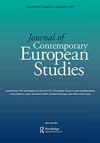新冠肺炎对欧洲议会的考验:欧洲议会首次应对全球大流行的投票动态和联盟模式
IF 1.2
3区 社会学
Q1 AREA STUDIES
引用次数: 2
摘要
尽管欧洲议会在塑造欧盟应对全球大流行方面发挥了切实的作用,但观察家们似乎系统性地忽视了欧洲议会(EP)在危机中的作用,他们主要把注意力集中在欧洲各国首都、政府间机构和欧盟委员会的协调作用上。考虑到欧洲议会独特的代表作用、直接的民主合法性以及在欧盟决策过程中日益重要的作用,欧洲议会的贡献也不容忽视。本文旨在通过捕捉党派和国籍之间的紧张关系,确定在对COVID-19危机的首次反应背景下,欧洲议会中立法者投票行为和联盟模式背后的关键决定因素。为此,本文提出了一系列假设,以解决欧洲议会中立法者的投票动态和合作与冲突模式。该分析基于对2020年4月关于“欧盟应对COVID-19大流行及其后果的协调行动”决议的80项修正案进行的投票。分析证实了与研究预期相符的模式。本文章由计算机程序翻译,如有差异,请以英文原文为准。
The European Parliament put to the test by COVID-19: voting dynamics and coalition patterns of the EP’s first response to the global pandemic
ABSTRACT Despite its tangible role in shaping the European Union’s response to the global pandemic, observers seem to have systematically disregarded the role of the European Parliament (EP) in the crisis, by primarily focusing their attention on the European capitals, the inter-governmental institutions, and the coordinating role of the European Commission. The contribution of the EP cannot be ignored also given its unique representative role, its direct democratic legitimacy, and its increasingly relevant role in the Union’s decision-making process. This article has the ambition to identify the key determinants behind the legislators’ voting behaviour and coalition patterns in the EP in the context of the first response to the COVID-19 crisis, by capturing the tension between partisanship and nationality. To do so, it proposes a set of hypotheses addressing legislators’ voting dynamics and patterns of cooperation and conflict in the EP. The analysis is based on votes held on 80 amendments to the April 2020 Joint motion for a resolution on ‘EU coordinated action to combat the COVID-19 pandemic and its consequences’. The analysis confirms patterns in lines with the expectations of the study.
求助全文
通过发布文献求助,成功后即可免费获取论文全文。
去求助
来源期刊

Journal of Contemporary European Studies
Multiple-
CiteScore
2.70
自引率
7.70%
发文量
84
期刊介绍:
The Journal of Contemporary European Studies (previously Journal of European Area Studies) seeks to provide a forum for interdisciplinary debate about the theory and practice of area studies as well as for empirical studies of European societies, politics and cultures. The central area focus of the journal is European in its broadest geographical definition. However, the examination of European "areas" and themes are enhanced as a matter of editorial policy by non-European perspectives. The Journal intends to attract the interest of both cross-national and single-country specialists in European studies and to counteract the worst features of Eurocentrism with coverage of non-European views on European themes.
 求助内容:
求助内容: 应助结果提醒方式:
应助结果提醒方式:


